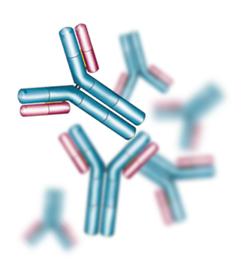Radioimmunotherapy treatment options for cancer patients are not without their own difficulties such as damage to surrounding non- cancerous cells and treatment side effects. Now radionuclides attached to antibodies have the potential to target radiation specifically to cancer cells, thereby reducing unwanted damage to healthy cells and decrease in side effects. Targeted alpha-particle radiation using the radioisotope 225Ac is a promising form of therapy for various types of cancer. However, although obstacles for this method such as finding suitable chelators for stable attachment of targeting monoclonalantibodies and the lack of cost-effective radiolabeling procedures have been solved, the process still requires a 2 step procedure that is expensive and involves the loss of 90% of the input 225Ac. Therefore a more efficient, economical process is needed to facilitate the use of this potentially useful agent. A murine study featured in this month’s Journal of Nuclear Medicine demonstrates an improved one-step method for producing stable and therapeutically active 225Ac antibodies. And following this procedure were able to increase the yield and specific activity of this therapy up to 30-fold, thereby achieving the goals of lowering cost and dose and offering additional therapeutic options for patients.












